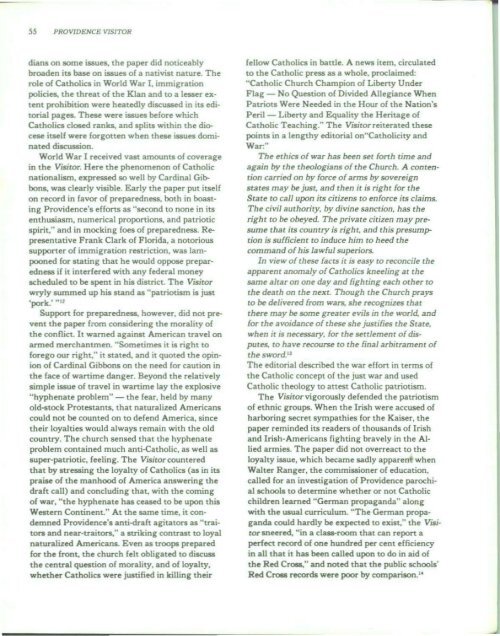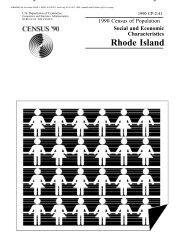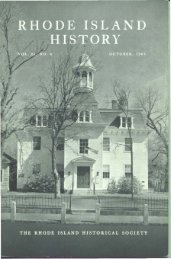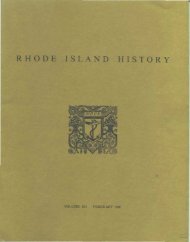RHODE ISLAND HISTORY - Rhode Island Historical Society
RHODE ISLAND HISTORY - Rhode Island Historical Society
RHODE ISLAND HISTORY - Rhode Island Historical Society
- No tags were found...
You also want an ePaper? Increase the reach of your titles
YUMPU automatically turns print PDFs into web optimized ePapers that Google loves.
55 PROVIDENCE VISITORdians on some issues. the paper did noticeablybroaden its base on issues of a nativist nature. Therole of Catholics in World War I, immigrationpolicies. the threat of the Klan and to a lesser extentprohibition were heatedly discussed in its editorialpages. These were issues before whichCatholics closed ranks, and splits within the dioceseitself were forgotten when these issues dominateddiscussion.World War I received vast amounts of coveragein the Visitor. Here the phenomenon of Catholicnationalism, expressed so well by Cardinal Gibbona.was clearly visible. Early the paper put itselfon record in favor of preparedness, both in boastingProvidence's efforts as "second to none in itsenthusiasm, numerical proportions. and patrioticspirit," and in mocking foes of preparedness. R~presentative Frank Clark of Florida, a notorioussupporter of immigration restriction, was lampoonedfor stating that he would cppcee preparednessif it interfered with any federal moneyscheduled to be spent in his district. The Visitorwryly summed up his stand as "patriotism is just'pork.' "uSuppon for preparedness, however, did not pr~vent the paper from considering the morality ofthe conflict. It warned against American travel onarmed merchantmen. "Sometimes it is right toforego our right," it stated, and it quoted the opinionof Cardinal Gibbons on the need for caution inthe face of wartime danger. Beyond the relativelysimple issue of travel in wartime lay the explosive"hyphenate problem" - the fear, held by manyold-stock Protestants, that naturalized Americanscould not be counted on to defend America, sincetheir loyalties would always remain with the oldcountry. The church sensed that the hyphenateproblem contained much anti-Catholic, as well assuper-patriotic, feeling. The Visitor counteredthat by stressing the loyalty of Catholics (as in itspraise of the manhood of America answering thedraft call) and concluding that, with the comingof war, "the hyphenate has ceased to be upon thisWestern Continent." At the same time, it condemnedProvidence's anti-draft agitators as "traitonand near-traitors," a striking contrast to loyalnaturalized Americans. Even as troops preparedfor the front, the church felt obligated to discussthe central question of morality, and of loyalty,whether Catholics were justified in killing theirfellow Catholics in battle. A news item, circulatedto the Catholic press as a whole, proclaimed:"Catholic Church Champion of Liberty UnderFlag - No Question of Divided Allegiance WhenPatriots Were Needed in the Hour of the Nation'sPeril- Liberty and Equality the Heritage ofCatholic Teaching." The Visitor reiterated thesepoints in a lengthy editorial on"Catholicity andWar..•The ethics of war has been set forth time andagain by the theologians ofthe Church. A contentioncsrriedon by force ofarms by sovereignstates may be JUSt, and then it is right for theState to calJ upon its citizens to enforce its claims.The civil authority. by divine sanction, has theright to be obeyed. The private citizen may pr~sume that its country is right, and this presumptionis sufficient to induce him to heed thecommand ofhis lawful superiors.In view ofthese facts it is easy to reconcile theapparent anomalyofCatholics kneeling at thesame altar on one day and fighting each other tothe death on the next. Though the Church praysto be delivered from wars. she recognizes thatthere may be some greater evils in the world. andfor the avoidance ofthese she justifies the State,when it is necessary, for the settlement ofdisputes.to have recourse to the final arbitrament ofthesword. uThe editorial described the war effort in terms ofthe Catholic concept of the just war and usedCatholic theology to attest Catholic patriotism.The Visitor vigorously defended the patriotismof ethnic groups. When the Irish were accused ofharboring secret sympathies for the Kaiser, thepaper reminded its readers of thousands of Irishand Irish-Americans fighting bravely in the Alliedarmies. The paper did not overreact to theloyalty issue, which became sadly apparent whenWaiter Ranger, the commissioner of education.called for an investigation of Providence parochialschools to determine whether or not Catholicchildren learned "German propaganda" alongwith the usual curriculum. "The German propagandacould hardly be expected to exist," the Visitorsneered. "in a class-room that can report aperfect record of one hundred per cent efficiencyin all that it has been called upon to do in aid ofthe Red CfCl8S,," and noted that the public schools'Red Croea records were poor by comparieon.u











